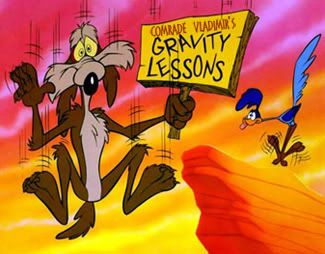Morality and the Wile E. Coyote Effect

Over the past few weeks a number of alliances within the New Hegemony have become increasingly self-aware and confident, believing that they can act with impunity thanks to the power-base sitting under them. The result has been an undeniable and boisterous break with many of the alliances that raised them into that position to begin with, as they explicitly contradict and even mock the beliefs they used to propagate. Every political break coincides with an equally fierce intellectual break, and this case is no different, as the question of morality in global politics is once again propelled into the spotlight. On one side of this debate we have GOONS, \m/ and the Mushroom Kingdom, among others, (hereafter referred to as Unjust Path 2.0) arguing that morality has no place in the world, while on the other we have those arguing that our activities should be considered through a moral lens as well as one of immediate self-interest. It is through this intellectual debate that Unjust Path 2.0 has demonstrated its lack of political understanding.
The position of Unjust Path 2.0 is well summed up by GOONS member Alonois, who asserts that "People TALK of morality. They do not ACT upon it." One is tempted to suggest that this is at least superficially true -- after all, nobody has stepped up to end the Red Safari. However, one is only so tempted because moral activity is so ingrained in all of us that it is taken for granted. We can thus take a simple example: the question of war. There has never [or if there has, extraordinarily rarely] been a significant war without a casus belli, strong or weak, and this is precisely because it is known that if one doesn't have a casus belli there will be serious political consequences, ranging from a severe loss of political capital to a declaration of war in defence of the attacked alliance. Moreover, if a casus belli is to be accepted then it must be accepted as having a moral legitimacy by the significant alliances of the world, and this is the very basis of debates on what constitutes a strong and what constitutes a weak casus belli -- one cannot get away with a casus belli over the colour of an enemy's hair, for example, precisely because such a reason has no moral legitimacy. We can go beyond this and question the moral consequences of everything from OOC attacks, to spying, to perma-ZI lists, to honouring treaties, to diplomatic norms and beyond. It is this plethora of social norms and rules that makes up the moral fabric of our world, usually without us even realising it.
It must be understood, however, that all these moral norms and rules are social constructs -- they do not exist in the abstract, but rather because they are supported (actively or passively) in the international arena by enough power that violating them becomes politically unwise. Given this, the consequences for violating the world's moral fabric, if you cannot convince the world of your case, goes beyond whether or not there is an immediate military reaction and into the far deeper questions of political support -- for this too is nothing more than a social construct.
Alliances enter into treaties and blocs because they see these things as representing their interests, and their interests in turn are merely a representation of their view of the ideal world -- whether military dictatorship or free-thinking utopia -- and their view of the ideal world is in turn merely an extension of their internal culture and morality. Thus, a violation of widely held moral concerns may not bring about immediate military repercussions, but it will nevertheless undermine the idea that alliance interests are advanced through affiliation to the violators, and thus significantly weaken the political ties that act to prevent military repercussions.
In the long run it is this process that leads to the hollowing out of hegemonies and ultimately to great wars. Alliances begin to view their interests as being in contradiction to the standing hegemony, and consequently seek out new vehicles and movements -- a new serious of treaties and blocs -- to advance themselves through. It was ignorance of this fact that led to the rapid destruction of the first Unjust Path and in part to the downfall of the Continuum. While Unjust Path 2.0 may be on much more stable ground at the moment, if they choose to believe that morality has no place in the world, and that talk is cheap, then they will quickly find themselves headed for a Wile E Coyote moment, where the political support that they depend on no longer supports the weight of their actions.


35 Comments
Recommended Comments